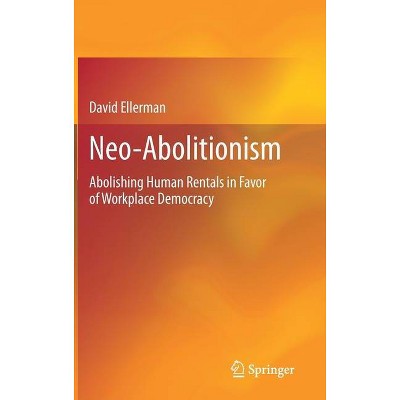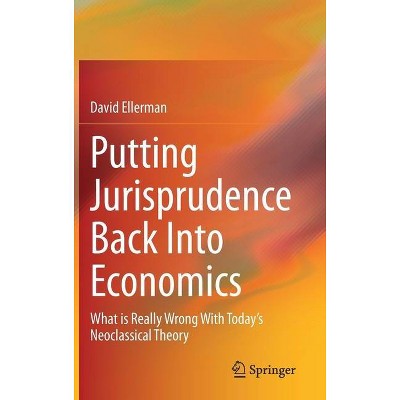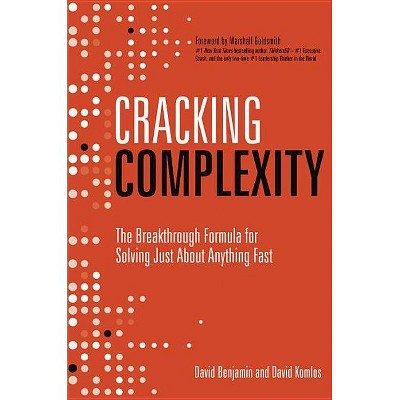Neo-Abolitionism - by David Ellerman (Hardcover)

Similar Products
Products of same category from the store
AllProduct info
<p/><br></br><p><b> Book Synopsis </b></p></br></br>1: Introduction1.1: Neo-Abolitionism1.2: What is "the system" being argued against?1.3: What is the system being argued for?2: Contract: The case against the human rental contract based on inalienability2.1: Contractual defenses of slavery2.2: History of inalienability theory2.3: Modern Theory of Inalienable Rights2.4: How to (Mis)Understand Inalienability Theory3: Property: The case against the human rental system based on private property rights3.1: The misnomer of "Capitalism" and the fundamental myth3.2: Marginal productivity theory3.3: History of property theory4: Governance: The case against the employment system based on democratic theory4.1: Intellectual history of consent-based non-democratic government4.2: Intellectual history of the case for democratic governance4.3: The debate about corporations5: Summary and Conclusions5.1: Conventional Classical Liberalism5.2: Summary: Inalienable rights theory5.3: Summary: The natural rights or labor theory of property5.4: Summary: Democratic theory and the democratic alternative<br><p/><br></br><p><b> From the Back Cover </b></p></br></br>This book argues for the abolition of the employment system in favor of workplace democracy and thus escapes the usual capitalism-versus-socialism binary choice by reframing the basic issue as the employment contract, not private property or a market economy. <br>The author repositions the political and economic debate in the lineage of abolitionism - against the owning of other people - which in its modern version of neo-abolitionism would also abolish the renting, or hiring, employing, or leasing of other people.<br>The overall argument is based on three recovered theories, each one of which is sufficient to yield the neo-abolitionist conclusion. These three rights-based theories are developed throughout the book. The three theories are 1) inalienable rights theory, 2) the natural rights or labor theory of property, and 3) democratic theory as based on a democratic constitution that only delegates governance rights versus a non-democratic constitution that alienates governance rights. <br>The book, therefore, is a must-read for everybody interested in a better understanding of the political economy, workplace democracy, rights-based theories, and the employment system.<p/><br></br><p><b> About the Author </b></p></br></br><b>David P. Ellerman</b> is an Associate Researcher at the School of Social Science, University of Ljubljana, Slovenia, and a Gordon Fellow at the Institute for Advanced Study, Stellenbosch, South Africa. In 2003 he retired to academia after 10 years at the World Bank where he was the economic advisor and speech-writer for the Chief Economist Joseph Stiglitz. In his prior university teaching, Ellerman taught over a twenty-year period in the Boston area in five disciplines: economics, mathematics, computer science, operations research, and accounting. He was educated at Massachusetts Institute of Technology (USA), and at Boston University where he has two masters degrees, one in philosophy and one in economics, and a doctorate in mathematics. Ellerman has published many articles in scholarly journals, as well as several books in economics, logic, mathematics, physics, philosophy, and law.
Price History
Price Archive shows prices from various stores, lets you see history and find the cheapest. There is no actual sale on the website. For all support, inquiry and suggestion messagescommunication@pricearchive.us




![No, David! - (David Books [Shannon]) by David Shannon (Hardcover)](https://target.scene7.com/is/image/Target/GUEST_e8e077f5-9e21-4075-85a5-95a540f6e77f)



![David Gets in Trouble - (David Books [Shannon]) by David Shannon (Hardcover)](https://target.scene7.com/is/image/Target/GUEST_aa170769-9d3c-441a-b8ec-92aa9c1881db)











